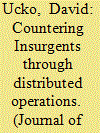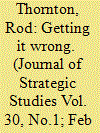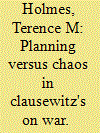| Srl | Item |
| 1 |
ID:
076550


|
|
|
|
|
| Publication |
2007.
|
| Summary/Abstract |
This article examines the emerging US Marine Corps concept of 'Distributed Operations' (DO) and its applicability to counter-insurgency. DO involves dispersing the force and empowering decentralised units so as to create a network of mobile, agile and adaptable cells, each operating with a significant degree of autonomy yet in line with the commander's overall intent. This concept's applicability to irregular campaigns is assessed with reference to the Malayan Emergency, in which the British and Commonwealth forces employed dispersed and decentralised small-unit formations to great effect. The article teases out the conditions that allowed DO to succeed in Malaya, and comments on the requirements and implications for the use of DO today in the prosecution of the 'Long War'.
|
|
|
|
|
|
|
|
|
|
|
|
|
|
|
|
| 2 |
ID:
076551


|
|
|
|
|
| Publication |
2007.
|
| Summary/Abstract |
This article considers the way in which a military force committed to a 'stabilization' operation can, through its own mistakes, actually make that mission much more difficult than it need be. The British Army was committed to a peace support task in Northern Ireland in 1969 but the errors made by those within its ranks went a long way in moving that task away from one of peace support to one of countering a fully fledged insurgency. Through an examination of the clumsiness displayed by the British Army in Northern Ireland in its initial period of deployment (August 1969 - March 1972) several parallels can be drawn with events recently in Iraq. What is more, fundamental lessons can be learnt from the British experience. These lessons still have relevance today as the West continues to commit forces to interventionary operations; forces which are making the same mistakes the British Army did nearly 40 years ago.
|
|
|
|
|
|
|
|
|
|
|
|
|
|
|
|
| 3 |
ID:
076553


|
|
|
|
|
| Publication |
2007.
|
| Summary/Abstract |
Clausewitz laid great emphasis on the planned construction of war, but this idea has received little attention from his commentators, who generally attach far greater importance to what he said about the chaotic elements of war, in particular its interactive nature and the friction inseparable from its conduct. This article gives long-overdue recognition to planning as a dominant theme of On War. The essential point Clausewitz makes concerning interaction is not that the enemy's responses are bound to disrupt our plans, but that our plans must aim to predict and incorporate his responses. Clausewitz acknowledges that friction creates enormous difficulties for the realization of any plan, but it is precisely in respect of this challenge that he develops the concept of military genius, whose capabilities are seen above all as the executive arm of planning.
|
|
|
|
|
|
|
|
|
|
|
|
|
|
|
|
| 4 |
ID:
076552


|
|
|
|
|
| Publication |
2007.
|
| Summary/Abstract |
This article deals with the specific views of the British naval historian Sir Julian Corbett (1854-1922) on the theoretical study of war, i.e. his theory on theory. What were Corbett's main ideas and how do they compare with those of Carl von Clausewitz and Antoine-Henri Jomini? To what extent are Corbett's ideas original? The conclusions reached are that, first, the intellectual kinship between Corbett and Clausewitz is especially pronounced in this aspect of military theory. Second, the intellectual affinity between Corbett's and Jomini's views on the theoretical study of war is indeed negligible. Finally, it is argued that Corbett presents only one original idea regarding the theoretical study of war and that this idea is problematic.
|
|
|
|
|
|
|
|
|
|
|
|
|
|
|
|
| 5 |
ID:
076549


|
|
|
|
|
| Publication |
2007.
|
| Summary/Abstract |
Many believe that US speed, precision, and situation awareness account for low Coalition casualties and limited damage to Iraqi infrastructure in the 2003 invasion of Iraq. The details of the campaign's actual conduct, however, suggest otherwise. An analysis using evidence collected in a series of 176 interviews with a wide range of campaign participants from both sides of the conflict suggests that Iraqi weaknesses, and not just US strengths, may have been necessary preconditions for the initial campaign's low cost - a finding with very different implications for defense policy than the prevailing view.
|
|
|
|
|
|
|
|
|
|
|
|
|
|
|
|